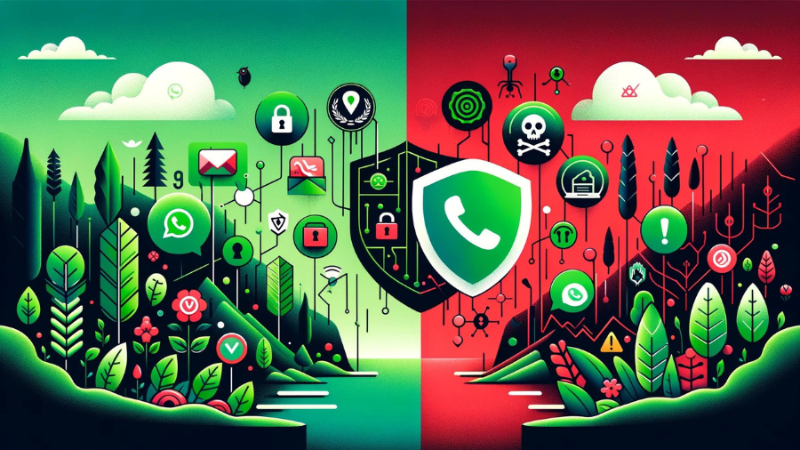Non-official vs Official Whatsapp API: Why to avoid pirated software
Non-official WhatsApp APIs, also known as pirated APIs, have been luring businesses across the globe with their reduced costs and easy implementation, bypassing Meta 's requirements.
However, everything has a price, especially when it sounds too good. That ’s why you must learn about the pirated and official API before making any hasty decisions.
Are you in a rush? The comparison table below outlines the differences between the Official WhatsApp API and the pirated API.
| Feature | Official WhatsApp Business API | Non-official (Pirated) WhatsApp API |
|---|---|---|
| Legality and Compliance | Fully legal and complies with WhatsApp's terms of service. | Illegal and violates WhatsApp's terms of service. |
| Data Security | High-level security measures to protect business and customer data. | Risk of data breaches and privacy issues. |
| Cost | Charges per conversation, with transparent pricing models. | It may appear cheaper initially but can lead to significant legal fines. |
| Support and Reliability | Official support from Meta and their partners and continuous updates for reliability. | No official support, and high risk of service interruptions. |
| Integration and Features | Access to advanced features, integrations, and official support for custom solutions. | Limited by the capabilities of the pirated API, with no access to official updates or new features. |
| Reputation and Trust | Enhances brand reputation and customer trust through compliance and security. | Risks damaging brand reputation and losing customer trust due to illegal activity and potential data leaks. |
| Risk of Being Banned | No risk of being banned by WhatsApp for using their official API. | There is a high risk of being banned or blocked by WhatsApp, disrupting business communications. |
| Scalability | Designed for scalability, supporting businesses as they grow. | It may not support scaling, with the potential for increased unreliability as business demands grow. |
| Legal Implications | No legal implications as it adheres to all regulations. | Potential for legal action against your business, including fines and account suspension. |
| Green Tick Verification | Your business can apply to get the verification badge. | Impossible to get verified on WhatsApp. |
What is the official WhatsApp API?
The official WhatsApp API is a platform that enables businesses to connect third-party software to WhatsApp and send a large volume of messages. It is also how Meta (Formerly known as Facebook) makes money from WhatsApp.
As you may know, Facebook, now called Meta, acquired WhatsApp in 2014 for 19 billion dollars . In 2014, WhatsApp 's goal was to grow the platform rather than monetize it by making it an ad platform. Things changed in 2018 with the release of the official API.
After all, it ’s fair and square for Meta to make a return on investment after paying billions of dollars to acquire the app. The WhatsApp application and the WhatsApp business app are still free to use. However, a business would have to pay for the official WhatsApp API if it needed any of the following features:
- Sending a large volume of bulk/broadcast messages
- Handling WhatsApp conversations with a chatbot
- Automating messages and notifications
- Connecting WhatsApp to CRM software to manage conversations and store contacts
- Connecting WhatsApp to a native application and enabling data exchange (Check how Uber connected their app to WhatsApp
So, if your business is looking for a secure and legitimate way to access any of the features mentioned above, the official WhatsApp API is the answer.
You can only access the official WhatsApp API through an official Meta partner or Business Solution Providers (BSP). And of course, you have to meet all the requirements specified by Meta:
- You should have a valid Meta business account.
- You should agree and comply with WhatsApp 's terms of service.
- You should comply with WhatsApp 's commerce policies.
- You should have a Facebook Business Manager account.
And, of course, the WhatsApp API is a mere programming interface, so if you don ’t have the programming capabilities to build your software, you can always rely on third-party tools or developers like Xenio .
How much does the official WhatsApp API cost?
The short answer is, “It depends.”First, you have to pay per conversation. Other costs, such as hosting costs, cost per message, or conversation costs, are specified by BSPs (Business Solution Providers) or independent software vendors who partner with them.
The only cost all these providers have in common is the Conversation-Based Pricing (CBP) . This means your business gets charged per conversation on WhatsApp, not per message. And the price of these depends on the conversation category that they fall under:
- Marketing: This includes conversations that are initiated by your business through promotional template messages
- Utility conversations: These include follow-ups on user actions or requests, such as delivery updates, payment reminders, opt-in confirmations, or feedback surveys.
- Authentication: As the name indicates, these enable your business to authenticate users with one-time passcodes
- Service: enable you to resolve customer inquiries
The pricing per conversation depends on your location. To understand the cost of your WhatsApp conversations, you can check Meta 's official WhatsApp rate cards.
In addition to the Conversation costs, some BSPs might charge additional costs, such as a fixed monthly hosting fee or an additional rate per message or conversation. Make sure to familiarize yourself with the pricing of your chosen BSPs.
What is an Unofficial/Pirated WhatsApp API?
Due to the costs and requirements to access the official WhatsApp API, some businesses resort to illegal and pirated methods and servers to get access to an API through which they can send bulk messages and promotions.
At the end of the day, going through all the steps to access the official API and complying with WhatsApp ’s commerce policy can be a challenge for some verticals. Also, some businesses want to avoid the cost of the WhatsApp API.
So, businesses mainly resort to this illegitimate means of accessing the API to reduce costs and bypass all the required steps to access the official WhatsApp API.
However, as tempting as these unofficial pirated WhatsApp APIs seem try to avoid them at all costs.
Why you should avoid pirated WhatsApp APIs?
While pirated APIs seem like a dream in terms of easy implementation and costs, they can quickly become a nightmare for your business.
Data and Security
Pirated APIs aren ’t secure, and your and your client 's data and privacy might get compromised . In other words, these servers hosting your API might leak sensitive data such as addresses, emails, passwords, and OTPs you or your customers sent.
Trust and online reputation
You will lose your target audience ’s trust and destroy your online reputation . Having a pirated API means that you ’ll mainly message users without their consent and expose your clients ’data to leaks and security breaches. So, it ’s safe to say that users will trust your brand less, and your business reputation will be damaged.
Risk of getting banned
WhatsApp is actively hunting down these pirated APIs and their servers and blocking or banning them. So, your number and even campaigns can suddenly be blocked. Moreover, WhatsApp can take legal action against your business for not complying with its terms of service.
Legal Implications &fines
WhatsApp 's terms of service strictly prohibit the use of pirated APIs. Using an unofficial WhatsApp API is illegal, and in some cases, it can lead to suspension of your WhatsApp and Meta accounts and monetary fines. These fines can be costly and might be higher than the money you saved by not opting into the official WhatsApp business API.
Unreliable services
By choosing a pirated API instead of the official one provided by Meta and its business solution providers, you 're compromising the quality of the services.
So with the pirated API, you can expect low or bad deliverability, downtime or even for your number to be removed or banned without any notice.
Feature limitations
Last but not least, many great automation and chatbot solutions are built by software vendors and Solution providers that work only with the official WhatsApp API. So it will be harder to find an automation solution, chatbot, or CRM integration if you ’re using a pirated API.
How to ensure compliance when using WhatsApp API?
Choosing the right software vendor and business solution provider is crucial if you want to access the WhatsApp API.
Your chosen software provider can really simplify the process of getting access to the WhatsApp API and even help you through it when necessary. Moreover, some API providers have solutions that are way more cost-effective and scalable than others.
So, if you ’re trying to access the WhatsApp API and find that the cost is too high, look for other BSPs or software vendors with more affordable options instead of resorting to the pirated API.
Things to keep in mind
While pirated WhatsApp APIs do seem tempting due to their perceived low cost and ease of access, their risks far outweigh any potential short-term benefits.
The official WhatsApp API, backed by Meta, offers businesses a secure, reliable, and legal way to engage with their customers through WhatsApp.
It ensures data privacy, maintains your business 's reputation, and provides access to advanced features and integrations, making it the clear choice for any serious business.
Opting for the official API aligns with legal and ethical standards but also positions your business for sustainable growth and customer trust.
Therefore, when considering your business 's long-term success and integrity, the official WhatsApp API is undoubtedly the better option than any pirated alternatives.

